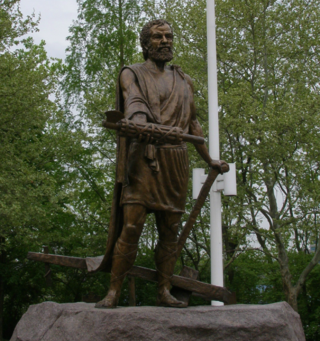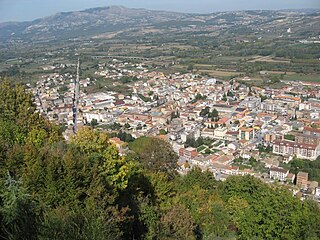
Lucius Quinctius Cincinnatus was a Roman patrician, statesman, and military leader of the early Roman Republic who became a famous model of Roman virtue—particularly civic virtue—by the time of the late Republic.
Gaius Nautius Rutilus was a Roman politician who was consul of the Roman Republic from 475 BC until 474 BC and from 458 BC until 457 BC.

Lucius Minucius Esquilinus Augurinus was a Roman politician who was consul in 458 BC and decemvir in 450 BC.

The Battle of Bovianum was fought in 305 BC between the Romans and the Samnites.
Appius Claudius Crassus InregillensisSabinus was a Roman senator during the early Republic, most notable as the leading member of the ten-man board which drew up the Twelve Tables of Roman law around 451 BC. He is also probably identical with the Appius Claudius who was consul in 471 BC.

The gens Minucia was an ancient Roman family, which flourished from the earliest days of the Republic until imperial times. The gens was apparently of patrician origin, but was better known by its plebeian branches. The first of the Minucii to hold the consulship was Marcus Minucius Augurinus, elected consul in 497 BC.
Esquilinus may refer to:
Aulus Sempronius Atratinus was a Roman Republican politician during the beginning of the 5th century BC. He served as Consul of Rome in 497 BC and again in 491 BC. He was of the patrician branch of his gens although the Sempronia gens also included certain plebeian families.
Marcus Minucius Augurinus was a Roman Republican politician of the patrician gens Minucia during the beginning of the 5th century BC. He served as Consul of Rome in 497 BC and 491 BC, both times serving together with Aulus Sempronius Atratinus.
Publius Minucius Augurinus was a Roman Republican politician of the patrician gens Minucia during the beginning of the 5th century BC. He served as Consul of Rome in 492 BC
Titus Geganius Macerinus was a Roman politician who served as Consul in 492 BC with Publius Minucius Augurinus.
The gens Genucia was a prominent family of the Roman Republic. It was probably of patrician origin, but most of the Genucii appearing in history were plebeian. The first of the Genucii to hold the consulship was Titus Genucius Augurinus in 451 BC.
Titus Genucius Augurinus was a Roman politician in the 5th century BC, consul and decemvir in 451 BC.
Lucius Papirius Crassus was a consul of the Roman republic in 436 BC and possibly a censor in 430 BC.
Quintus Minucius Esquilinus was, according to tradition, a Roman politician and general from the early Republic, who served as consul in 457 BC as the colleague of Gaius Horatius Pulvillus. During his term of office, a military threat from the Aequi and then the Sabines was said to have prevented internal conflict between the patricians and plebeians. Minucius marched with a force against the Sabines, but was unable to bring the enemy to battle.
Gnaeus Genucius Augurinus came from the ancient plebeian gens Genucia and was a high magistrate of the early Roman Republic.
Lucius Titinius Pansa Saccus was a Roman politician in the fifth and fourth centuries BC.
Tiberius Minucius Augurinus was a Roman politician and member of gens Minucia.
Genucius is a name. Notable people with the name include: